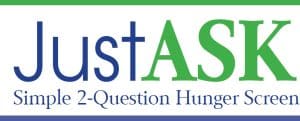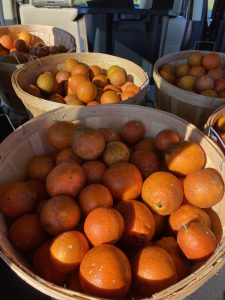Just Ask

Identify Hunger & Support Those At Risk
You can volunteer in the mission to end hunger by inviting and recruiting your physicians and other healthcare providers to discreetly identify patients in need of emergency food assistance.
Healthcare providers can use these two simple questions to identify patients experiencing hunger or food insecurity. A personal conversation with you might be what they need to take the next step and get started today!
- In the past 12 months, were you worried your food would run out before you had money to buy more?
- In the past 12 months, did you find the food you bought didn’t last and you didn’t have money to get more?
Screen & Intervene: Addressing Food Insecurity Among Older Adults is a five-module course for health care providers and stakeholders working with adults ages 50 and over.
The completely-free, one-hour course features:
- The definition, prevalence, and associated risk factors of food insecurity among older adults;
- The health and nutrition consequences of food insecurity;
- How to screen for food insecurity among older adults;
- How to intervene when individuals screen positive for food insecurity;
- How to connect individuals to the Supplemental Nutrition Assistance Program (SNAP), other nutrition resources, and community partners; and
- A new opportunity to report quality improvement to CMS
The USDA defines food security as having “access, at all times, to enough food for an active, healthy life for all household members.” This means a person or family can be considered food-insecure if they:
- Experienced difficulty or obstacles keeping enough food in the house; or
- Had to purchase lower quality, lower variety, or less desirable food; or
- Had to eat less or less often to make food supplies last until finances were replenished
 There is a host of research that shows food insecurity can have serious health effects across the lifespan and how incredibly important fruits and vegetables are for children, adults, and seniors.
There is a host of research that shows food insecurity can have serious health effects across the lifespan and how incredibly important fruits and vegetables are for children, adults, and seniors.
- “Each year, 1.5 million deaths globally are attributed to low vegetable consumption and another 2.4 million are attributed to low fruit consumption.” (Read the source article here.)
- “Eating a diet rich in vegetables and fruits… may reduce the risk for heart disease, including heart attack and stroke.”
- “Eating a diet high in certain vegetables and fruits may protect against certain types of cancers.”
- “Adding vegetables to your diet can add fiber and potassium, which many Americans do not get enough of daily.” (Read more at MyPlate.gov.)
Download The Hunger Screener

